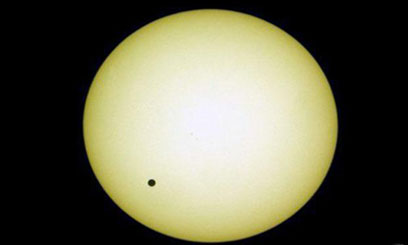The nearly seven-hour passage, also known as a transit, will be seen as a black dot on the solar surface of the planet as Venus passes between the Earth and the Sun.
Considering the vastness of the sky, a planet to pass the disc of the Sun is a wonderful and rare sight, but experts warn that it should only be viewed through approved solar filters to avoid the risk of blindness.
There have been 53 transits of Venus across the Sun between 2000 BC and the last one was in 2004, but only six transits of Venus have ever been recorded.
The transit commences on June 6 at 1:10am and ends at 7:50am. Over Eastern Africa, it will be observed on Wednesday at sunrise for just a few minutes.
The entire event will be widely visible from the western Pacific, eastern Asia and eastern Australia.
Most of North and Central America, and northern South America will witness the beginning of the transit, but the Sun will set before the event ends.
Since the apparent diameter of Venus is nearly 1 arc-minute, it is just possible to see without optical magnification as it crosses the Sun, but one must use solar filter protection to avoid eye damage.
Observing techniques and equipment are similar to those used for lunar eclipses and experts advise people who use binoculars and telescopes to view the transit to equip them with adequate filtration to ensure safe solar viewing.





No comments:
Post a Comment